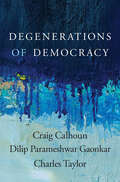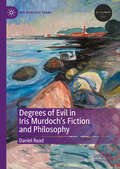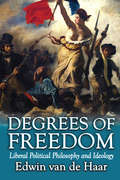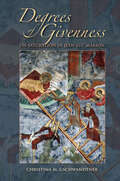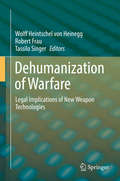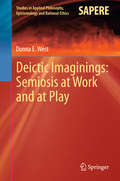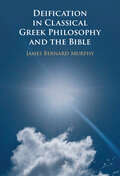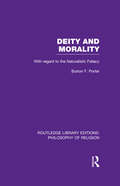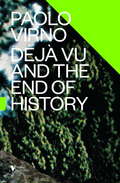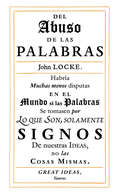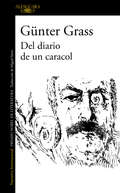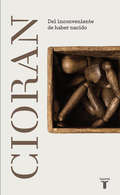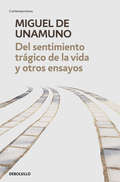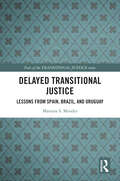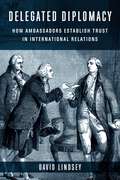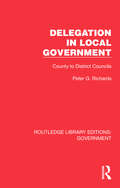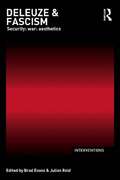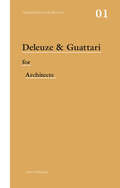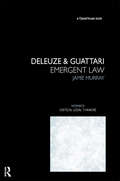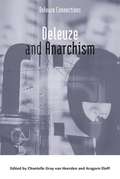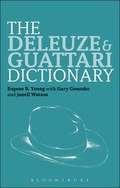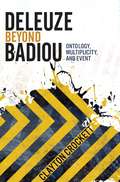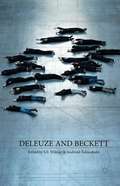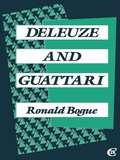- Table View
- List View
Degenerations of Democracy
by Charles Taylor Craig Calhoun Dilip Parameshwar GaonkarThree leading thinkers analyze the erosion of democracy’s social foundations and call for a movement to reduce inequality, strengthen inclusive solidarity, empower citizens, and reclaim pursuit of the public good. Democracy is in trouble. Populism is a common scapegoat but not the root cause. More basic are social and economic transformations eroding the foundations of democracy, ruling elites trying to lock in their own privilege, and cultural perversions like making individualistic freedom the enemy of democracy’s other crucial ideals of equality and solidarity. In Degenerations of Democracy three of our most prominent intellectuals investigate democracy gone awry, locate our points of fracture, and suggest paths to democratic renewal. In Charles Taylor’s phrase, democracy is a process, not an end state. Taylor documents creeping disempowerment of citizens, failures of inclusion, and widespread efforts to suppress democratic participation, and he calls for renewing community. Craig Calhoun explores the impact of disruption, inequality, and transformation in democracy’s social foundations. He reminds us that democracies depend on republican constitutions as well as popular will, and that solidarity and voice must be achieved at large scales as well as locally. Taylor and Calhoun together examine how ideals like meritocracy and authenticity have become problems for equality and solidarity, the need for stronger articulation of the idea of public good, and the challenges of thinking big without always thinking centralization. Dilip Parameshwar Gaonkar points out that even well-designed institutions will not integrate everyone, and inequality and precarity make matters worse. He calls for democracies to be prepared for violence and disorder at their margins—and to treat them with justice, not oppression. The authors call for bold action building on projects like Black Lives Matter and the Green New Deal. Policy is not enough to save democracy; it will take movements.
Degrees of Evil in Iris Murdoch's Fiction and Philosophy (Iris Murdoch Today)
by Daniel ReadThis is the first survey of Murdoch’s exploration of evil, addressing aesthetic, philosophical, political and theological perspectives. The study demonstrates how her work engages with currently urgent issues of trauma, terrorism and psychopathy and brings her works into dialogue with key figures in twentieth- and twenty-first-century discussions of evil, including Hannah Arendt, Carl Gustav Jung, Susan Neiman and Simone Weil. These resonances are traced through close readings of Murdoch’s published fiction and philosophy in combination with unpublished texts, including annotations, interviews and letters. Murdoch’s detailed and nuanced portrayal of evil invites readers to explore the complexities of human behaviour and the potential for moral failure.
Degrees of Freedom: Liberal Political Philosophy and Ideology
by Edwin Van de HaarLiberalism has been the leading political theory of the past three hundred years and, by far, the most dominant ideology. Many think tanks are associated with liberal ideas, and most Western countries are considered liberal democracies. But does liberalism really cover the wide range of political ideas found in Western civilization? Degrees of Freedom examines liberalism's universal claims and explains how liberal thinkers formulated insights that apply to all aspects of politics. It also contrasts liberalism and conservatism. Edwin van de Haar divides liberalism into three main variants: classical liberalism, social liberalism, and libertarianism. Without claiming that this is the only possible categorization of liberalism, he argues that this subdivision is the most comprehensible way out of liberal confusion. He explores how these forms of liberalism, found in popular parlance, relate to liberal political theory and ideology. Domestic politics and international relations are presented as a whole, in the firm belief that one cannot meaningfully present an overview of any tradition in political theory by stopping at national borders.
Degrees of Givenness: On Saturation in Jean-Luc Marion
by Christina M. Gschwandtner“Beautifully written . . . advances scholarship on Marion, and offers a sustained and critical analysis of two weaknesses in Marion’s phenomenology.” —Tamsin Jones, author of A Genealogy of Marion’s Philosophy of ReligionThe philosophical work of Jean-Luc Marion has opened new ways of speaking about religious convictions and experiences. In this exploration of Marion’s philosophy and theology, Christina M. Gschwandtner presents a comprehensive and critical analysis of the ideas of saturated phenomena and the phenomenology of givenness. She claims that these phenomena do not always appear in the excessive mode that Marion describes and suggests instead that we consider degrees of saturation. Gschwandtner covers major themes in Marion’s work—the historical event, art, nature, love, gift and sacrifice, prayer, and the Eucharist. She works within the phenomenology of givenness, but suggests that Marion himself has not considered important aspects of his philosophy.“Christina M. Gschwandtner has established herself as a valued reader of contemporary French philosophy in general and of Marion’s writings in particular. She was the first to consider at length Marion’s extensive reflections on Descartes and to evaluate their theological importance, and she has translated two of Marion’s books from the French. This new study, Degrees of Givenness, extends her contribution to our understanding of this fecund philosopher.” —Notre Dame Philosophical Reviews
Dehumanization of Warfare: Legal Implications of New Weapon Technologies
by Wolff Heintschel von Heinegg Robert Frau Tassilo SingerThis book addresses the technological evolution of modern warfare due to unmanned systems and the growing capacity for cyberwarfare. The increasing involvement of unmanned means and methods of warfare can lead to a total removal of humans from the navigation, command and decision-making processes in the control of unmanned systems, and as such away from participation in hostilities - the "dehumanization of warfare. " This raises the question of whether and how today's law is suitable for governing the dehumanization of warfare effectively. Which rules are relevant? Do interpretations of relevant rules need to be reviewed or is further and adapted regulation necessary? Moreover, ethical reasoning and computer science developments also have to be taken into account in identifying problems. Adopting an interdisciplinary approach the book focuses primarily on international humanitarian law, with related ethics and computer science aspects included in the discussion and the analysis.
Deictic Imaginings: Semiosis at Work and at Play
by Donna E. WestThis work represents the first integrated account of how deixis operates to facilitate points of view, providing the raw material for reconciling index and object. The book offers a fresh, applied philosophical approach using original empirical evidence to show that deictic demonstratives hasten the recognition of core representational constructs. It presents a case where the comprehension of shifting points of view by means of deixis is paramount to a theory of mind and to a worldview that incorporates human components of discovering and extending spatial knowledge. The book supports Peirce's triadic sign theory as a more adequate explanatory account compared with those of Bühler and Piaget. Peirce's unitary approach underscores the artificiality of constructing a worldview driven by logical reasoning alone; it highlights the importance of self-regulation and the appreciation of otherness within a sociocultural milieu. Integral to this semiotic perspective is imagination as a primary tool for situating the self in constructed realities, thus infusing reality with new possibilities. Imagination is likewise necessary to establish postures of mind for the self and others. Within these imaginative scenarios (consisting of overt, and then covert self dialogue) children construct their own worldviews, through linguistic role-taking, as they legitimize conflicting viewpoints within imagined spatial frameworks.
Deification in Classical Greek Philosophy and the Bible
by James Bernard MurphyTo be human is to strive to be better, and we cannot be better without knowing what is best. In ancient Greek philosophy and the Bible, what is best is god. Plato and Aristotle argue that the goal of human life is to become as much like god as is humanly possible. Despite its obvious importance, this theme of assimilation to god has been neglected in Anglo-American scholarship. Classical Greek philosophy is best understood as a religious quest for divinity by means of rational discipline. By showing how Greek philosophy grows out of ancient Greek religion and how the philosophical quest for god compares to the biblical quest, we see Plato and Aristotle properly as major religious thinkers. In their shared quest for divine perfection, Greek philosophy and the Bible have enough in common to make their differences deeply illuminating.
Deity and Morality: With Regard to the Naturalistic Fallacy (Routledge Library Editions: Philosophy of Religion)
by Burton F. PorterThis book describes the "naturalistic fallacy", as attributed to Hume, that non-moral premises cannot logically entail a moral conclusion, and distinguishes it from the similarly named though subtly different fallacy identified by Moore in Principia Ethica by comparing and contrasting its presence in a range of ethical or moral systems. A review of Hume’s position elicits the implications to theological naturalism, and how this relates to Kierkegaard’s "paradox of faith" and the doctrine of ineffability. Methods of logical examination of religious language are discussed, leading to the dissection of the analytic proposition that ‘God is Good’ and of the connotations of proper names. Porter concludes from this a solution to the naturalistic fallacy: that "good" is essential to "God" by definition, and therefore that premises relating to God must contain an inherent morality. Originally published in 1968, this book includes topics such as Mediaeval attitudes to deity and morality; Religious myth, images and language; Comparative conceptions of deity.
Deja Vu and the End of History
by David Broder Paolo VirnoDéjà vu, which doubles and confuses our experience of time, is a psychological phenomenon with peculiar relevance to our contemporary historical circumstances. From this starting point, the acclaimed Italian philosopher Paolo Virno examines the construct of memory, the passage of time, and the "end of history." Through thinkers such as Bergson, Kojève and Nietzsche, Virno shows how our perception of history can become suspended or paralysed, making the distinction between "before" and "after," cause and effect, seem derisory. In examining the way the experience of time becomes historical, Virno forms a radical new theory of historical temporality.From the Trade Paperback edition.
Del abuso de las palabras (Serie Great Ideas #Volumen 35)
by John LockeIdeas que han cambiado el mundo A lo largo de la historia, algunos libros han cambiado el mundo. Han transformado la manera en que nos vemos a nosotros mismos y a los demás. Han inspirado el debate, la discordia, la guerra y la revolución. Han iluminado, indignado, provocado y consolado. Han enriquecido vidas, y también las han destruido. Taurus publica las obras de los grandes pensadores, pioneros, radicales y visionarios cuyas ideas sacudieron la civilización y nos impulsaron a ser quienes somos. <P><P>John Locke modificó el rumbo de la filosofía al asegurar que la razón es la llave al conocimiento. Opiniones, percepción, ideas, verdad o lenguaje son algunos de los temas tratados en estos textos, que sin duda forman parte de los que más han influido en el pensamiento occidental.
Del diario de un caracol
by Günter GrassUno de los textos más personales del Premio Nobel alemán. Ideado como un diario de la campaña electoral que realizó en 1969 a favor de la candidatura de Willy Brandt, trasciende por su complejidad la mera anécdota política, para instalarse entre el ensayo y la prosa poética. En 1969, Günter Grass participa en la campaña electoral a favor del Partido Socialista de Alemania y, muy especialmente, de su amigo Willy Brandt. El diario de su gira le sirve luego para escribir un libro en el que las fronteras entre narrativa, política y autobiografía se confunden. El autor se dirige a sus cuatro hijos -y, así, a las nuevas generaciones alemanas- para hablarles de la democracia y de los horrores del Tercer Reich. Y crea una historia: la del profesor de instituto Hermann Ott, llamado «Zweifel» (duda), que apoyó a los judíos de Dánzig durante su persecución y expulsión. Para Grass, el riesgo está siempre en los extremos. El simbolismo político del caracol resulta claro: en la historia del progreso no hay saltos sino un lento deslizarse hacia adelante, y desde esa idea lucha contra quien pretenden sobrepasarlo por la izquierda o la derecha. «Sólo quien se ha sentado en una vacía concha de caracol y ha vivido en el lado de sombra de la Utopía puede medir el progreso.»
Del inconveniente de haber nacido (Bolsillo Serie #Vol. 10)
by E. M. CioranUn autor de culto. Taurus recupera uno de los textos clave de la obra de E. M. Cioran. <P><P>Estos aforismos, escritos en su etapa de madurez, condensan su pensamiento de manera tan lacónica como eficaz y coherente, y constituyen un hallazgo decisivo para cualquier amante de las paradojas y la ironía. <P>Tallados con precisión, hablan del tiempo, de Dios, de la religión, del silencio, de la muerte y del nacimiento, «una casualidad, un accidente risible». En ellos conviven una devastadora lucidez junto a un humor sin límites, y la lógica más aplastante junto al mayor contrasentido. <P>Opuesto al optimismo y la autocomplacencia de un modo radical, Cioran no desalienta, tiene el talento de fortalecer. «Las contradicciones de Cioran, lejos de invalidar su obra, más bien revelan la fuerza y la belleza de esta.» Éric Chevillard, Le Monde
Del sentimiento trágico de la vida y otros ensayos: Vida de don Quijote y Sancho | Del sentimiento trágico de la vida | La agonía del cristianismo
by Miguel de UnamunoLos ensayos más destacados de Miguel de Unamuno reunidos en un mismo volumen. Unamuno no es únicamente uno de los personajes literarios más destacados de nuestra literatura, sino que, además, también se le considera un filósofo crucial que se convirtió en una destacada figura del pensamiento existencialista. El presente volumen reúne tres de las obras filosóficas más importantes de Unamuno. En Vida de Don Quijote y Sancho (1905) ofrece una exégesis en clave filosófica de la gran obra de Miguel de Cervantes y que pondría las bases de su pensamiento existencialista desarrollado en Del sentimiento trágico de la vida (1912) y La agonía del cristianismo (1925). En estas dos obras, Unamuno reflexiona acerca del sentido de la vida, la moral y la religión, la razón y las pasiones, así como el pensamiento científico. La crítica ha dicho...«Miguel de Unamuno representó un modo de sentir.»Max Aub
Delayed Transitional Justice: Lessons from Spain, Brazil, and Uruguay
by Mariana S. MendesThis book addresses the issue of the timing of transitional justice policies in countries that had negotiated transitions from authoritarianism to democracy. Why are transitional justice measures often being implemented decades after the events they refer to? More specifically, what combination of factors leads to the implementation of transitional justice policies at certain moments in time? And, what explains countries’ different choices and trajectories? To address these questions, this book pursues a comparative analysis of three cases: comparing a case of ‘robust’ implementation of transitional justice measures (Uruguay), a case where only victim-centered measures were approved (Spain), and a case that sits in between these two (Brazil). Through an in-depth empirical analysis of these specific country-cases, and focusing on seven different transitional justice initiatives, the book identifies the determinants behind delayed transitional justice policies and explains why such policies are more robust in some settings than in others. In doing so, it provides a holistic account of post-transitional justice outcomes, offering more general conclusions and insights about the study of the drivers of transitional justice. This book will appeal to scholars and students of transitional justice in politics, law, and sociology, as well as to policymakers involved in the implementation and administration of transitional justice measures.
Delegated Diplomacy: How Ambassadors Establish Trust in International Relations
by David LindseyWhy do states still need diplomats? Despite instantaneous electronic communication and rapid global travel, the importance of ambassadors and embassies has in many ways grown since the middle of the nineteenth century. However, in theories of international relations, diplomats are often neglected in favor of states or leaders, or they are dismissed as old-fashioned.David Lindsey develops a new theory of diplomacy that illuminates why states find ambassadors indispensable to effective intergovernmental interaction. He argues that the primary diplomatic challenge countries face is not simply communication—it is credibility. Diplomats can often communicate credibly with their host countries even when their superiors cannot because diplomats spend time building the trust that is vital to cooperation. Using a combination of history, game theory, and statistical analysis, Lindsey explores the logic of delegating authority to diplomats. He argues that countries tend to appoint diplomats who are sympathetic to their host countries and share common interests with them. Ideal diplomats hold political preferences that fall in between those of their home country and their host country, and they are capable of balancing both sets of interests without embracing either point of view fully.Delegated Diplomacy is based on a comprehensive dataset of more than 1,300 diplomatic biographies drawn from declassified intelligence records, as well as detailed case studies of the U.S. ambassadors to the United Kingdom and Germany before and during World War I. It provides a rich and insightful account of the theory and practice of diplomacy in international relations.
Delegation in Local Government: County to District Councils (Routledge Library Editions: Government)
by Peter G. RichardsOriginally published in 1956, this book outlines the history of delegation in local government since the establishment of county councils in 1888. It describes the use made of delegation over a wide range of council services. The technique of delegation has become more important in recent years and represents the compromise of the competing claims of county and district councils to control local government. This book is an important contribution both to the detailed study of local administration and to the debate on the future pattern of local government.
Deleuze & Fascism: Security: War: Aesthetics (Interventions)
by Brad Evans Julian ReidThis edited volume deploys Deleuzian thinking to re-theorize fascism as a mutable problem in changing orders of power relations dependent on hitherto misunderstood social and political conditions of formation. The book provides a theoretically distinct approach to the problem of fascism and its relations with liberalism and modernity in both historical and contemporary contexts. It serves as a seminal intervention into the debate over the causes and consequences of contemporary wars and global political conflicts as well as functioning as an accessible guide to the theoretical utilities of Deleuzian thought for International Relations (IR) in a manner that is very much lacking in current debates about IR. Covering a wide array of topics, this volume will provide a set of original contributions focussed in particular upon the contemporary nature of war; the increased priorities afforded to the security imperative; the changing designs of bio-political regimes, fascist aesthetics; nihilistic tendencies and the modernist logic of finitude; the politics of suicide; the specific desires upon which fascism draws and, of course, the recurring pursuit of power. An important contribution to the field, this work will be of great interest to students and scholars of international relations, fascism and international relations theory.
Deleuze & Guattari for Architects (Thinkers for Architects)
by Andrew BallantyneThe work of Gilles Deleuze and Felix Guattari has been inspirational for architects and architectural theorists in recent years. It has influenced the design work of architects as diverse as Greg Lynn and David Chipperfield, and is regularly cited by avant-gardist architects and by students, but usually without being well understood. The first collaboration between Deleuze and Guattari was Anti-Oedipus: Capitalism and Schizophrenia, which was taken up as a manifesto for the post-structuralist life, and was associated with the spirit of the student revolts of 1968. Their ideas promote creativity and innovation, and their work is wide-ranging, complex and endlessly stimulating. They range across politics, psychoanalysis, physics, art and literature, changing preconceptions along the way. Deleuze & Guattari for Architects is a perfect introduction for students of architecture in design studio at all levels, students of architecture pursuing undergraduate and postgraduate courses in architectural theory, academics and interested architectural practitioners.
Deleuze & Guattari: Emergent Law (Nomikoi: Critical Legal Thinkers)
by Jamie MurrayDeleuze & Guattari: Emergent Law is an exposition and development of Deleuze & Guattari's legal theory. Although there has been considerable interest in Deleuze & Guattari in critical legal studies, as well as considerable interest in legality in Deleuze & Guattari studies, this is the first book to focus exclusively on Deleuze & Guattari and law. Situating Deleuze & Guattari's engagement with social organisation and legality in the context of their theory of 'abstract machines' and 'intensive assemblages', Jamie Murray presents their theory of law as that of a two-fold conception of, first, a transcendent molar law and, second, an immanent molecular emergent law. Transcendent molar legality is the traditional object of legal theory. And, as explicated here, immanent molecular emergent law is the novel juridical object that Deleuze & Guattari identify. Developing this conception, Deleuze & Guattari: Emergent Law draws out its implications for current and for future legal theory; arguing that it provides the basis for a new jurisprudence capable of creating new concepts of legality.
Deleuze And Anarchism (Deleuze Connections)
by Aragorn Eloff Chantelle HeerdenExplores Deleuze and Guattari's own diverse conceptions of anarchism and expands it in the spirit of their philosophy <p><p> This collection of 13 essays addresses and explores Deleuze and Guattari's relationship to the notion of anarchism: in the diverse ways that they conceived of and referred to it throughout their work, and also more broadly in terms of the spirit of their philosophy and in their critique of capitalism and the State. <p> Both Deleuze and Guattari were deeply affected by the events of May '68 and an anarchist sensibility permeates their philosophy. However, they never explicitly sustained a discussion of anarchism in their work. Their concept of anarchism is diverse and they referred to in very different senses throughout their writings. This is the first collection to bring Deleuze and Guattari together with anarchism in a focused and sustained way.
Deleuze And Guattari Dictionary
by Gary Genosko Gregg Lambert Eugene B. Young Janell WatsonThe Deleuze and Guattari Dictionary is a comprehensive and accessible guide to the world of Gilles Deleuze and Felix Guattari, two of the most important and influential thinkers in twentieth-century European philosophy. Meticulously researched and extensively cross-referenced, this unique book covers all their major sole-authored and collaborative works, ideas and influences and provides a firm grounding in the central themes of Deleuze and Guattari's groundbreaking thought. Students and experts alike will discover a wealth of useful information, analysis and criticism. A-Z entries include clear definitions of all the key terms used in Deleuze and Guattari's writings and detailed synopses of their key works. The Dictionary also includes entries on their major philosophical influences and key contemporaries, from Aristotle to Foucault. It covers everything that is essential to a sound understanding of Deleuze and Guattari's philosophy, offering clear and accessible explanations of often complex terminology. The Deleuze and Guattari Dictionary is the ideal resource for anyone reading or studying these seminal thinkers or Modern European Philosophy more generally.
Deleuze Beyond Badiou: Ontology, Multiplicity, and Event
by Clayton CrockettRestoring the reputation of a twentieth-century philosopher and his relevance to twenty-first-century political thought.
Deleuze Beyond Badiou: Ontology, Multiplicity, and Event (Insurrections: Critical Studies in Religion, Politics, and Culture)
by Clayton CrockettFirst published in 1997, Alain Badiou's Deleuze: The Clamor of Being cast Gilles Deleuze as a secret philosopher of the One. In this work, Clayton Crockett rehabilitates Deleuze's position within contemporary political and philosophical thought, advancing an original reading of the thinker's major works and a constructive conception of his philosophical ontology. Through close readings of Deleuze's Difference and Repetition, Capitalism and Schizophrenia (with Felix Guattari), and Cinema 2, Crockett argues that Deleuze is anything but the austere, quietistic, and aristocratic intellectual Badiou had portrayed. Instead, Crockett underscores Deleuze's radical aesthetics and innovative scientific, political, and mathematical forms of thought. He also refutes the notion Deleuze retreated from politics toward the end of his life. Using Badiou's critique as a foil, Crockett maintains the profound continuity of Deleuze's work and builds a general interpretation of his more obscure formulations.
Deleuze and Beckett
by S. E. Wilmer Audronė ŽukauskaitėDeleuze and Beckett is a collection of essays illuminating similarities between the philosophies and practices of Deleuze and Beckett. The contributors include some of the leading Beckett and Deleuze specialists in the world, and their essays address different ideas and concepts of Deleuzian philosophy as well as a wide range of Beckett's oeuvre, including his novels, short stories, stage and television plays, and film work. The book considers Deleuze's interpretation of Beckett's work anddemonstrates that Deleuzian concepts and ideas can be usefully applied to Beckett's texts in order provide a greater understanding of Beckett's characters and their journeys. Deleuze's philosophy helps us to recognize that what has been seen as the private territory of despair, loneliness, and emptiness in Beckett's work masks a world of flow and fluctuation that expresses multiple and heterogeneous possibilities.
Deleuze and Guattari (Critics of the Twentieth Century)
by Ronald BogueFirst published in 2002. Routledge is an imprint of Taylor & Francis, an informa company.
